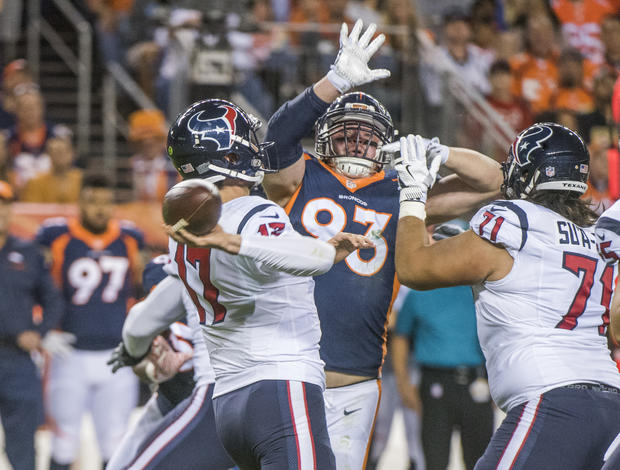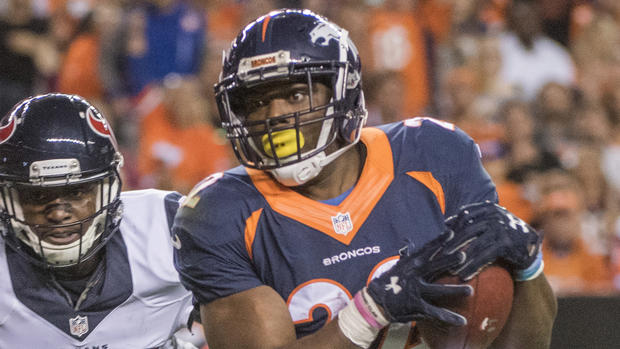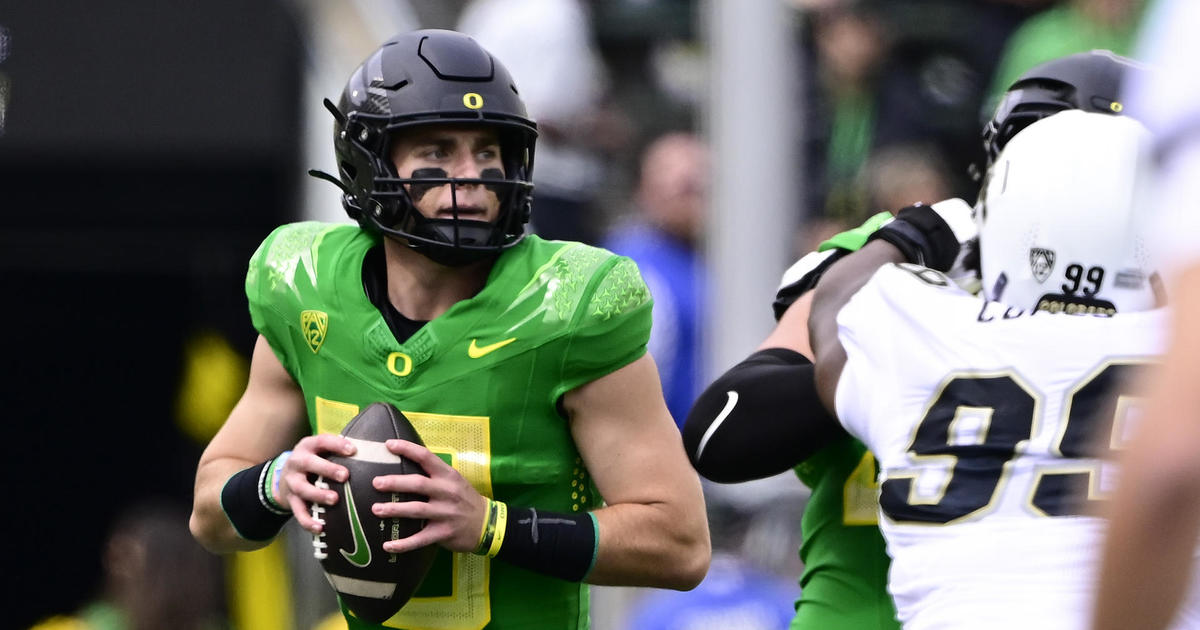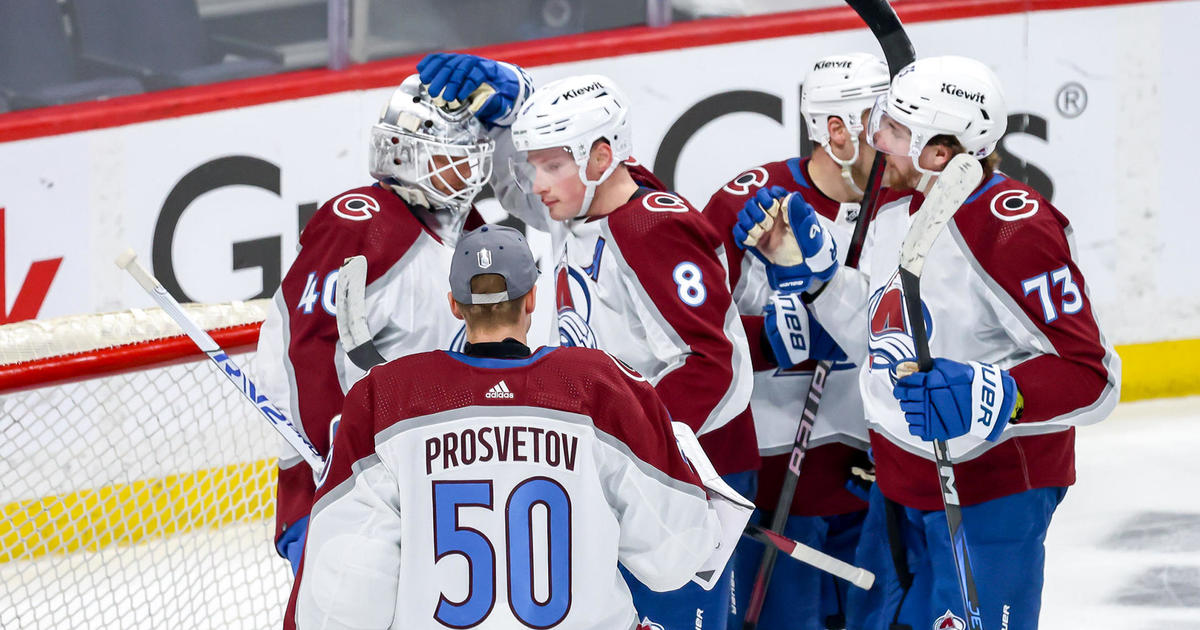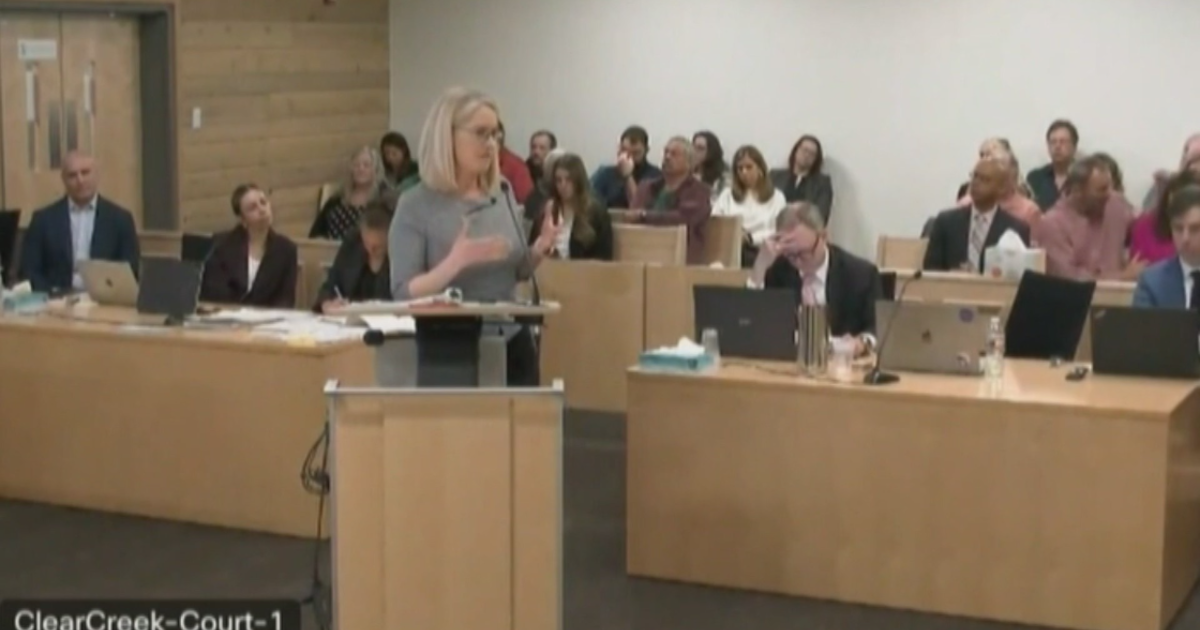Report Card: Broncos Grades In Monday's Win Range From A To C-
ENGLEWOOD, Colo. (The Sports Xchange) - The Denver Broncos started by taking away the deep ball from Brock Osweiler. Then they took away everything else.
By the time Denver's defense completed its disassembly of Osweiler and the Houston Texans' passing game, the Broncos had become just the second team in the last three seasons to hold the Texans without a touchdown, joining the Patriots.
Osweiler left with no hard feelings, as evidenced by the dozens of hugs he shared with his former Broncos teammates after the 27-9 Denver win.
"I just told him I loved him and missed him. He said the same thing," said Broncos cornerback Chris Harris Jr.
But Osweiler certainly left with some damage to his pride, and the Broncos emerged with their fifth win of the season and renewed confidence after a two-game skid threatened to send them careening out of a tie for first place in the AFC West race.
None of Osweiler's completions covered more than 13 yards, as the Broncos took away the deep routes, with safety help accentuating their man-to-man coverage early in the game. As the night progressed, the safeties spent more time taking care of intermediate routes around the line to gain, forcing Osweiler into checkdown mode and leaving him with an average of 3.2 yards per attempt by the time the game concluded.
"We knew what we had to take away the deep shots with Brock," Harris said. "We know he has a very strong arm. So we wanted to eliminate that off the top. And then once we were able to take away his deep shots, we knew he couldn't beat us all game."
The Broncos were only credited with one sack -- when Osweiler lost his grip on the football as he prepared to throw early in the fourth quarter -- and rarely knocked him down, but the threat of pressure seemed to rattle Osweiler, who was often getting rid of the football or taking the checkdown option at the first sign of a rush -- almost as though he was seeing ghosts.
"I think we had him pretty spooked a little bit," Harris said. "Having to go against us, and a team that knows him, and he knows us so well. It was a tough game for him."
But it was just the game the Broncos -- and their defense -- needed. After allowing touchdowns on the first possessions in four of the first six games, the defense opened the game with two three-and-outs and never let up, holding an opponent to single digits in points for the second time this month.
"We knew that if we could come out on the first drive, get a stop, then we'd be back to normal," Harris said.
The Broncos have allowed just 16.7 points per game this season, a figure that is better than their average last year. And while the defense was gashed on the ground, it is allowing 24 fewer passing yards per game than it did last year.
It's not the exact same as the defense that shredded opponents en route to Super Bowl 50. But with DeMarcus Ware expected to return in the next two weeks, this defense might turn out to be even better if it can find ways to contain opposing ground games.
-- Quarterback Trevor Siemian threw half as many passes as he did the previous game against the San Diego Chargers -- and that is exactly what the Broncos want.
Although the Broncos came out throwing, with passes on their first six plays from scrimmage, the pass emphasis merely set up the run, which in turn would open up limited, but effective, opportunities to push the ball downfield. Siemian averaged 11 yards per completion and 6.28 yards per attempt, executed the play action smoothly and increased his streak of passes without an interception to 133, the sixth-longest streak in Broncos history.
"I think he's getting more comfortable from a call standpoint," Broncos coach Gary Kubiak said. "He's not making some of the mistakes that he made earlier in the year."
He's also getting better at his pre-snap calls and adjustments. Several of the strongest runs for C.J. Anderson and Devontae Booker came after he adjusted the call at the line of scrimmage.
"Trevor did a great job last night of getting our team in some great runs," Kubiak said. "Trevor had a lot to do with us running the ball well so we're getting more comfortable with him, letting him go at the line of scrimmage and giving him some either-or type football plays."
-- The Broncos' offense will not work unless C.J. Anderson, Devontae Booker -- or both -- are able to run the football effectively.
Monday night represented the first time that this aspect of the offense has worked as Gary Kubiak hoped it would, as the two backs combined for 190 yards -- 107 for Anderson and 83 for Booker -- on 33 combined carries, allowing the Broncos to crank up their play-action game and set up one-on-one matchups downfield that Emmanuel Sanders was able to exploit.
REPORT CARD VS. TEXANS
PASSING OFFENSE: B -- What the Broncos' passing offense lacked in frequency, it made up for in efficiency. After throwing 50 times in San Diego, Trevor Siemian only had to throw 25 passes; he completed 14 for 157 yards while avoiding big mistakes; his current streak of 133 consecutive passes without an interception is the sixth-longest in Broncos history.
RUSHING OFFENSE: A-minus -- With a season-high 190 rushing yards, the Broncos finally uncorked the ground game they'd hoped to have from the season's outset. Downfield blocking from center Matt Paradis and a proclivity for running through tacklers by C.J. Anderson and Devontae Booker helped spur the performance, which saw both Anderson and Booker score once apiece.
PASS DEFENSE: A -- The Broncos didn't need sacks in order to be disruptive. The Texans often kept a tight end and a running back in to block for Brock Osweiler, which freed the Broncos to have blanket coverage on Texans receiving targets, especially around the line to gain. Just three of Osweiler's completions was for more than 10 yards, with none longer than 13, and downfield threat DeAndre Hopkins was limited to just 36 yards and an average of 7.2 yards per reception.
RUSH DEFENSE: C-minus -- Houston had success running draw plays out of the shotgun, including two early third-down conversions of 25 and 17 yards that set up the Texans' first two field goals. Texans running backs Alfred Blue and Lamar Miller picked up 82 yards on nine shotgun carries, an 8.1-yard average that included three first downs and the Texans' two longest gains of the night -- both of which came when Shane Ray was caught in the backfield behind the play, opening up a seam to the left side.
SPECIAL TEAMS: B -- Denver limited Houston's return opportunities and production, holding the Texans to averages of 5.5 yards on punt returns and 14.0 yards on kickoffs, in part because of outstanding placement from Brandon McManus in dropping kickoffs inside the 5-yard line and outside the numbers. Riley Dixon had a solid 40.7-yard net punting average, dropping two punts inside the 20-yard line. McManus was perfect on placekicks. Jordan Norwood filled in for Cody Latimer on kickoff returns in addition to handling punts; he averaged 11 yards on three punt returns and got 19 yards on his lone kickoff return on a night of missed opportunities.
COACHING: B-plus -- Gary Kubiak returned to the sideline, and the impact was felt -- especially on offense, where an early pattern of over-reliance on the pass and penalties was squelched by the second quarter after a first-quarter performance that looked much like most of the game against San Diego. The defense also adapted to the Texans' emphasis on short passes with tight ends and running backs kept in the backfield for protection, and prevented Houston from getting any big plays in its vertical passing game.
